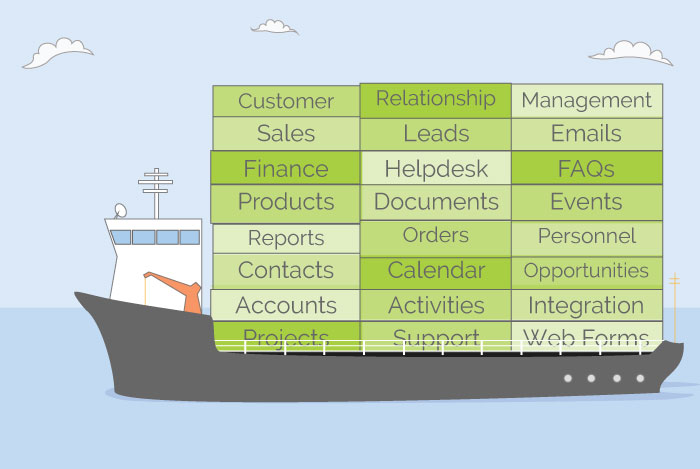What Does CRM Stand For?
2 Jun 2018
CRM stands for Customer Relationship Management and refers to a type of software for managing your prospect and customer details. It also refers to your interactions with them. This could include emails and phone calls to sending out marketing campaigns and support ticket management.
So that’s what it is, but what can it do for you?
Comprehensive CRM systems
Those in the industry will talk about using these systems for everything from helping them manage their time more effectively to project management to invoicing to…well, just about anything that relates to your relationship with your customers (and those who you want to have as customers).
Customer Relationship Management sounds, to a lot of people, like a glorified address book. But the best CRM systems work to manage all aspects of that relationship.
Managing your Sales Pipeline
A customer doesn’t start out as a customer, they start out as a Lead or a prospect.
They start out needing to talk to your business about what you can do for them, so you need a place to keep track of their contact details. You also need somewhere to record your conversations with them and the ins-and-outs of what they want to buy from you.
Your CRM can help keep track of these conversations around new business, as well as the internal discussions and estimates. That’s just the start of the “relationship” part of the CRM definition.
Keeping in Touch with your Customers
Once they’ve become your customer, you need all that information to stay in an easy to reference location. This way you can check back and make sure that everything is going to plan with this first, important purchase.
In the longer term, you want to be able to see a full history of the products they’ve purchased from you and the kinds of questions they’ve had regarding these products.
You need to know when things haven’t gone so well and what kinds of extras they were interested in, even if they never went ahead with their expansion plans.
And that’s the management part of the CRM definition.
A Central Location
The best CRM systems will cover all these aspects of the customer relationship and so much more. So while CRM stands for “customer relationship management” what it means for your business is a central hub that everything else can build out from.
You can manage your customer support desk, invoicing, internal and external project management, and all your teams’ tasks and scheduling: all in one place.
This gives you the ability to maintain personal and in-depth relationships with every single one of your customers…but that’s a bit too much for an acronym, I think, MPIDRESOC doesn’t have quite the same ring as CRM.
What else can customer relationship management software do?
There are dozens of online guides that will help you identify what CRM can do for you and what you should be asking your potential suppliers.
In our experience, there are two big ticket items that often come up in these conversations:
- How will it help me manage my team?
- What tedious tasks can it do for me?
Management oversight
This first one is fairly obvious, managers and directors want to be able to get quick overviews of their teams’ performance.
It all depends on how involved the manager or director wants to be with the CRM system itself.
Some managers are looking for dashboards both within the system and without. The benefit of in-system dashboards is that they can see an overview and then drill down into the details easily, with just a click. External dashboards can be great ways to combine the data from your CRM solution with information from somewhere else, Google Analytics for example.
We’ve also got some mini-reports and at-a-glance tools in a few of our modules, just to give another way to access this overview information.
On the other hand, you also come across people who want only scheduled reports in their email, they may not even want to have a login to the system! This tends to be for directors or higher up managers. They want to see overview information without having to take any extra steps that might distract them from the million and one other things they are currently juggling.
The key with management oversight of a CRM is having a variety of options.
Automation and workflow
The other big question we get asked about what else CRM solutions can do involves taking away some of the tedium of certain jobs. What do I mean by this?
Let’s say you send out the same five emails to every new client, on a set schedule. Instead of having to remember to send these out, [opencrm] lets you set up automated Email Plans, so these emails are created, scheduled, and sent…all without you having to do anything!
Or maybe you know that every new Project of a particular type, let’s say installation, will be assigned to a certain individual and other key fields populated in a reliable way. Instead of having this format documented somewhere for your team to remember to do (and do accurately) each time, why not use Workflow to update the Project?
Each business has different needs and the really important thing for a customer relationship management system to provide for them is the flexibility to meet their needs.
Although I originally hail from northern California, as soon as I arrived in Yorkshire I knew it was the place for me! At OpenCRM, I started out in the Business Development team, and then moved into compliance and Q&A because I love telling people what to do…ok, that’s not the real reason, but it makes for a good bio one-liner. When I’m not in the office, you can usually find me tramping through the dales, crafting, gardening, or with my nose in a book.